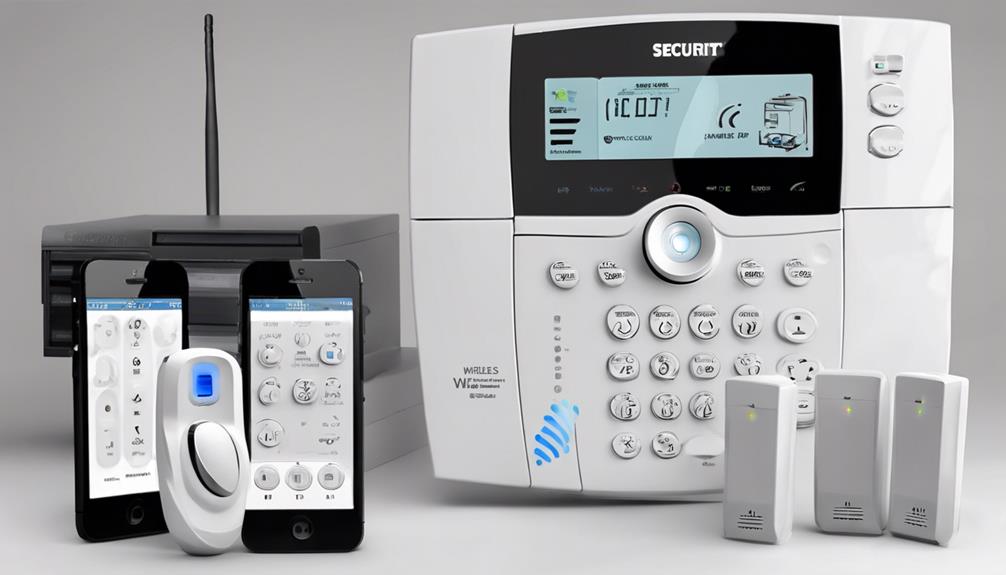When weighing wireless versus wired security systems, consider the reliability of wired systems with stable connections and minimal interference, perfect for maximum security. With powered-by-home electrical systems, wired setups escape battery issues and deliver dependable performance. Hacking a wired system necessitates physical access, a bonus for heightened security. If you're looking for easy DIY installation and portability, wireless systems might be your choice, but remember they need strong cybersecurity defenses. Each system has its perks, so select wisely based on your security needs and home setup.
Key Takeaways
- Wired systems offer superior reliability with stable connections and minimal interference.
- Wireless systems provide flexibility but are susceptible to signal loss and hacking vulnerabilities.
- Wired systems are powered by the home's electrical system, eliminating battery-related issues.
- Wireless systems are easy to install and maintain but require robust cybersecurity measures.
- Consider lifestyle, budget, and security needs when choosing between wired and wireless security systems.
Operation and Technology
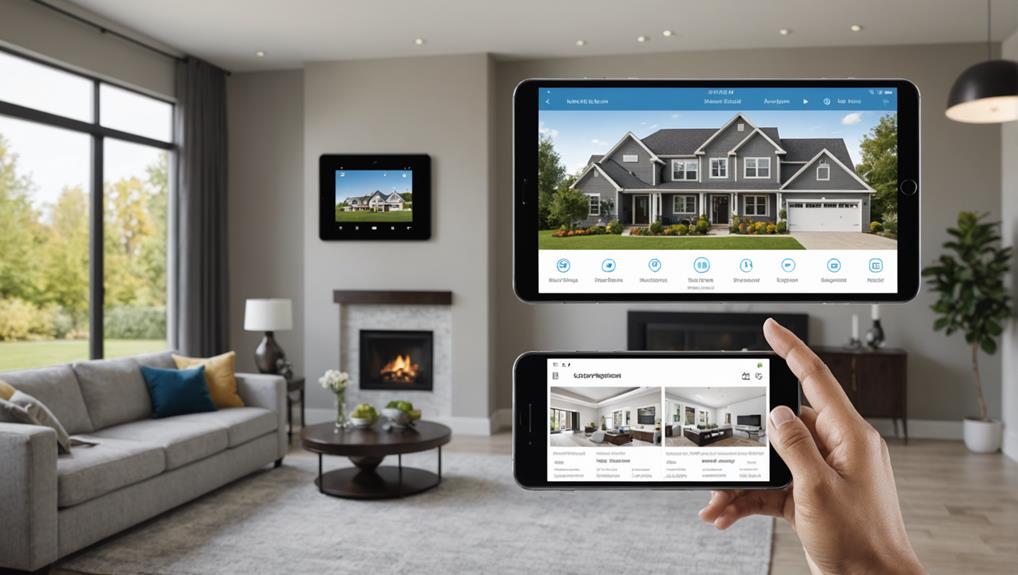
When considering the operation and technology of wireless versus wired security systems, it's essential to understand the fundamental differences in how they function.
Wired security systems connect sensors to a central control panel using concealed wires, ensuring stable connections with minimal interference. In contrast, wireless systems utilize radio frequency technology for communication between sensors and the control panel, offering more flexibility in installation and placement.
According to an in-depth comparison of these systems, wired systems generally provide superior reliability in signal transmission and reduced susceptibility to interference.
Both wired and wireless systems employ sensors at entry points and high-traffic areas to trigger alarms upon detecting unauthorized access. Notifications for security breaches can be sent via phone calls, text messages, or mobile apps, ensuring real-time alerts for users.
While both systems rely on similar technology for monitoring and alerts, wired systems typically provide higher reliability in signal transmission and are less vulnerable to hacking compared to their wireless counterparts.
Understanding the nuances of how wired and wireless systems operate is vital in choosing the best security solution for your needs.
Benefits and Disadvantages
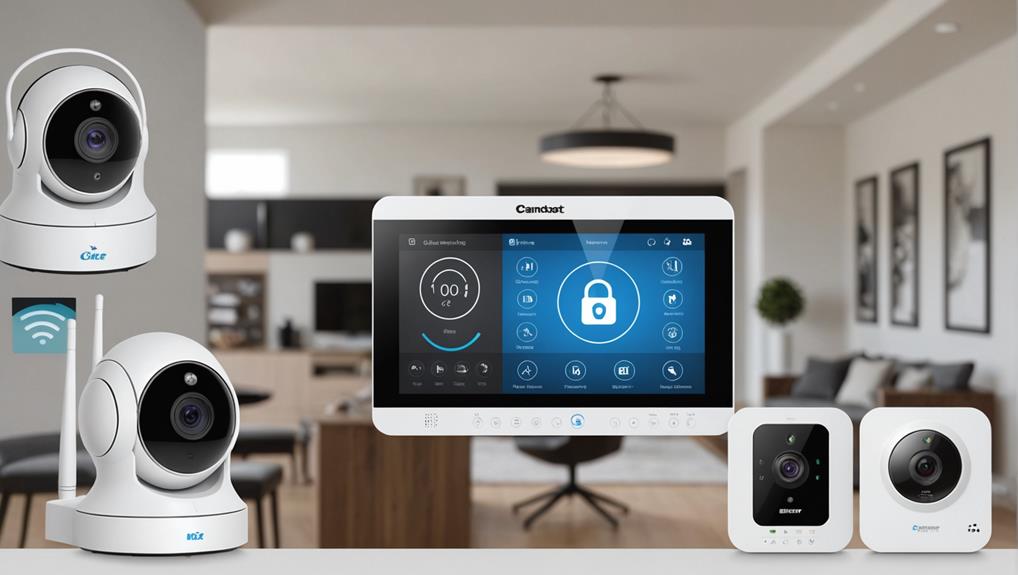
Enhancing your understanding of the benefits and disadvantages of both wired and wireless security systems can assist you in making an informed decision tailored to your specific needs.
| Aspect | Wireless Security Systems |
|---|---|
| Installation | Easy DIY setup, no professional installation needed. |
| Battery Life | Battery-operated, requires regular maintenance. |
| Signal Loss | Susceptible to interference, signal loss possible. |
| Cloud Storage | Offers cloud storage with possible subscription fees. |
| Environmental Factors | Affected by environmental conditions like weather or other devices. |
| Aspect | Wired Systems |
| Installation | Typically requires professional installation. |
| Battery Life | Powered by home's electrical system, no battery issues. |
| Signal Loss | Stable connection with minimal interference. |
| Local Storage | Utilizes local storage, avoiding additional costs. |
| Cost | Lower overall costs due to fewer components and reduced false alarms. |
Understanding these key aspects can help you weigh the benefits and disadvantages to determine which type of security system aligns best with your requirements.
Hybrid Systems and Solutions

Hybrid systems offer a unique blend of wired and wireless components, enhancing your security setup with advanced features and adaptability.
These systems can provide the best of both worlds, leveraging the reliability of wired connections and the flexibility of wireless technology.
Compatibility with your existing infrastructure is key to maximizing the effectiveness of these systems, ensuring seamless integration and ideal security coverage.
With personalized security solutions and support from providers like ADT, you can tailor your system to meet your specific needs and enhance your overall safety.
Hybrid System Integration
Integrating hybrid systems into your home security setup can revolutionize the way you protect your property. By combining traditional wired components with cutting-edge wireless technology, you can enhance your security coverage without starting from scratch.
These hybrid security systems offer the flexibility to integrate various technologies to meet your specific security needs, whether it's utilizing wired cameras or modern wireless devices. However, ensuring compatibility between these components is vital for seamless integration and functionality. Consultation with security specialists, such as those at ADT, can help guarantee a smooth shift.
Hybrid systems can also leverage cellular technology for monitoring, providing an extra layer of security and reliability, especially during internet outages that might affect purely wireless systems.
The integration of interactive services further enhances the user experience, allowing for real-time monitoring and control from your mobile devices. With hybrid system integration, you can have peace of mind knowing your home is secure and easily manageable.
Compatibility and Upgrades
When considering the compatibility and upgrades of hybrid security systems and solutions, it is essential to assess the existing technologies in your setup before proceeding with integration. Hybrid systems seamlessly combine wired security components with wireless devices, offering a flexible and scalable solution for modern security needs. Before upgrading, verify compatibility between your current wired components and the new wireless devices you plan to integrate. Many modern hybrid systems support interactive features, such as real-time alerts and remote monitoring via mobile apps, enhancing your overall security experience. Companies like ADT provide expert guidance to verify a smooth integration process, guaranteeing that diverse security technologies work harmoniously together. Upgrading to a hybrid system not only enhances security but also offers the adaptability needed to incorporate new features and meet evolving security requirements.
| Hybrid Systems Features | Benefits |
|---|---|
| Seamless integration | Enhanced security |
| Interactive capabilities | Real-time alerts |
| Remote monitoring | Mobile app accessibility |
| Scalability | Adaptability for upgrades |
| Expert guidance | Smooth integration process |
Personalized Security Solutions
Curious about how you can customize your security setup to match your unique needs and preferences? Hybrid security systems offer personalized solutions that blend the reliability of wired components with the flexibility of wireless technology.
These systems allow for seamless integration of existing wired setups with new wireless devices, enhancing functionality without requiring a complete system overhaul. To guarantee compatibility and a smooth changeover, consulting with security specialists like those at ADT is recommended.
Hybrid solutions not only support interactive services but also provide features such as remote access, real-time monitoring, and the ability to automate smart home devices like lights.
As technology advances, hybrid systems can now incorporate cellular technology, offering added security and reliability. With their versatility, hybrid security systems are an ideal choice for modern homeowners seeking a tailored security solution that meets their individual preferences and requirements.
Vulnerability Reporting and Feedback
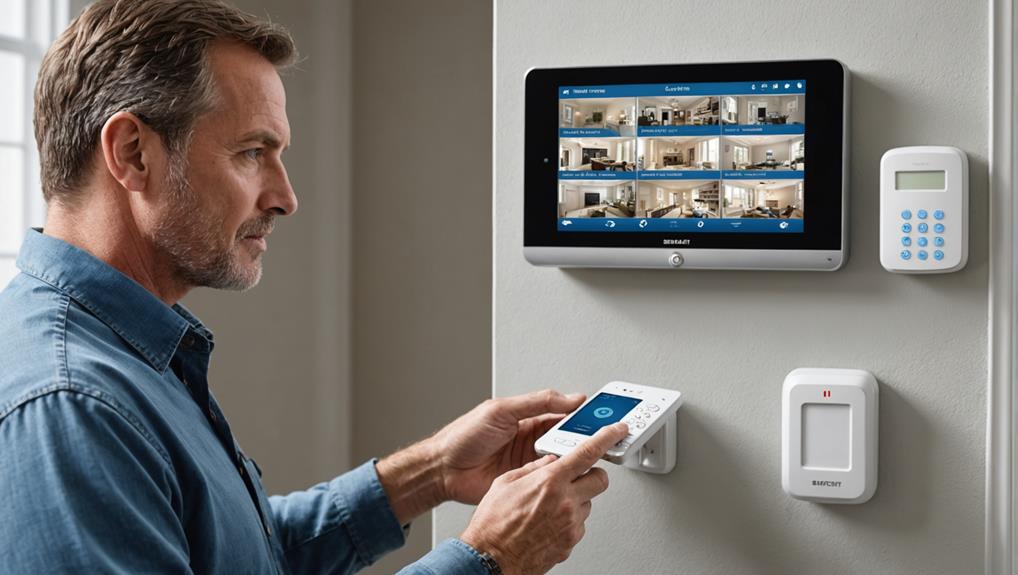
When it comes to ensuring the security of your home or business, reporting bugs and vulnerabilities in your security system is essential.
While wireless systems offer significant advantages such as easier installation and greater flexibility, they also come with potential drawbacks.
Your feedback plays an important role in the continuous improvement of security systems, allowing for timely resolution of issues.
Providing contact information for follow-up on reported vulnerabilities demonstrates a commitment to enhancing product integrity and user trust.
Bug Reporting Process
Encouraging users to actively report bugs or vulnerabilities in ADT products is an essential step in ensuring the robust security of your system. By engaging in the bug reporting process, you play a significant role in upholding the integrity and trustworthiness of your wireless or wired security system.
Your feedback serves as a valuable source of information for continuous improvements, allowing ADT to address any concerns promptly and effectively.
When reporting a bug or vulnerability, make sure to provide detailed information and contact details to facilitate follow-up communication. ADT is committed to promptly addressing security issues to maintain the integrity of its products and your trust in the system.
Your input is highly valued, and regular updates and improvements are implemented based on the feedback received from users like you.
Remember that your active participation in the bug reporting process not only enhances the security of your system but also contributes to the overall effectiveness and reliability of ADT products.
User Input Mechanisms
To guarantee the continuous improvement and security robustness of ADT products, users are essential contributors through the utilization of user input mechanisms such as vulnerability reporting and feedback.
Your experiences and insights play an essential role in addressing security concerns and enhancing the integrity of security systems. By actively participating in reporting vulnerabilities and providing feedback, you help ADT ascertain that prompt attention is given to any potential issues.
The feedback mechanisms in place allow for a collaborative effort between users and the company to meet evolving safety needs effectively. Your input is valued in shaping the future of security systems and maintaining the trust of customers.
Remember that your contributions through user input mechanisms not only help address current concerns but also drive the continuous evolution of ADT products to better serve your security needs.
Comparison of Home Security Systems
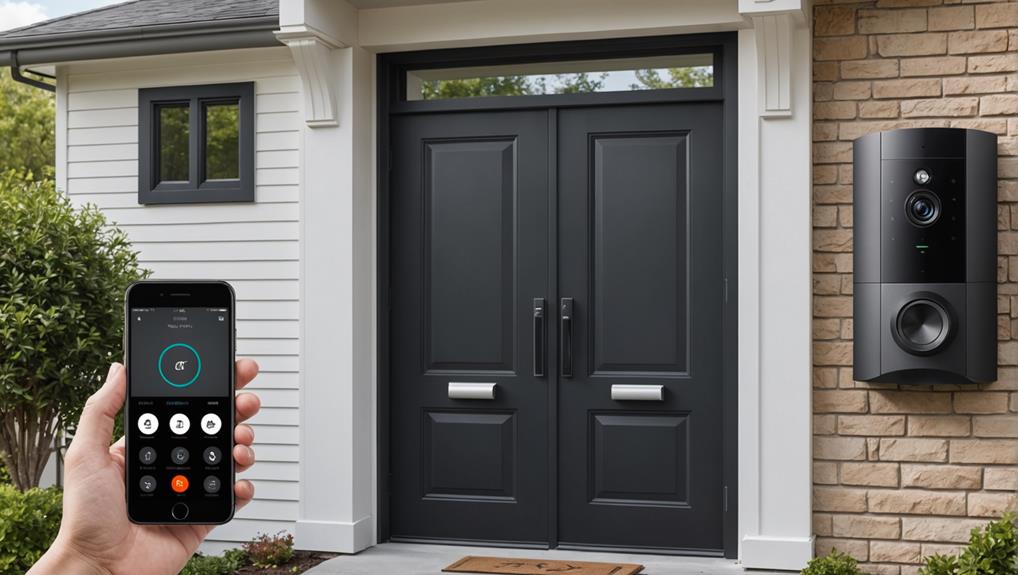
For those seeking to enhance their home security, comparing the features of wired and wireless systems is essential.
Wired security systems offer stable connections unaffected by Wi-Fi interference, ideal for those prioritizing reliability. Wired systems also tend to integrate seamlessly with existing home automation setups.
In contrast, wireless systems provide easy installation and portability, catering to renters or frequent movers. While wireless systems have lower initial costs, ongoing expenses for cloud storage and battery replacements should be considered.
Wired systems often result in long-term savings due to the absence of monthly fees. With regard to security, wired systems are less prone to hacking since they operate independently of the internet, while wireless systems require robust cybersecurity measures.
When deciding between the two, consider your lifestyle needs, budget, and security requirements. Wired systems excel in reliability and long-term savings, while wireless systems offer flexibility and easy installation.
Ultimately, choosing the right system depends on your individual preferences and priorities. Make an informed decision based on your unique circumstances.
Network Stability and Security
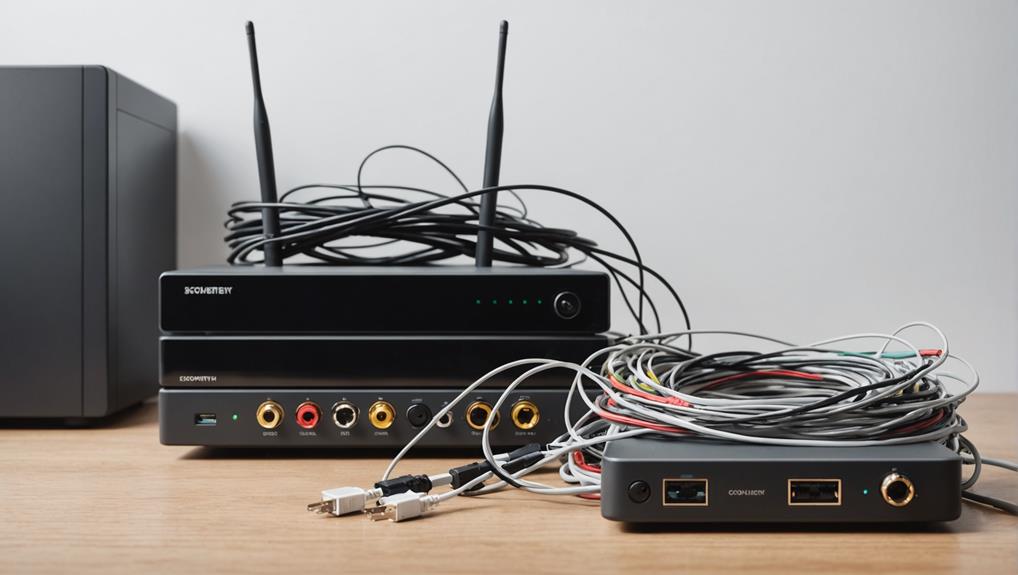
When it comes to the stability and security of your home network, the choice between wired and wireless security systems plays a significant role.
Wired security systems offer a stable connection free from interference, guaranteeing reliable performance for security monitoring. In contrast, wireless systems can be prone to disruptions due to radio wave interference, potentially leading to false alarms or connectivity issues.
The physical nature of wired connections enhances security, as hacking requires physical access, unlike wireless systems that can be compromised remotely. Additionally, wired systems typically use local storage, reducing the risk of data breaches associated with cloud services commonly used by wireless systems.
Wired security systems are known for their long-term reliability, making them a dependable choice for homeowners.
It's crucial to take these factors into account when deciding on a security system to guarantee the network stability and security of your home are prioritized. Choose the system that best aligns with your needs for a secure and reliable home security solution.
Frequently Asked Questions
Which Is Better, Wired or Wireless Security?
When deciding between wired or wireless security, consider your specific needs.
Wired systems offer stability and lower long-term costs, while wireless ones provide easy installation and smart home integration. Both offer protection against intruders.
Evaluate what matters most to you – reliability or convenience. Prioritize what makes you feel safe and secure in your home.
Choose the system that aligns with your priorities and budget for peace of mind.
What Are the Disadvantages of a Wireless Alarm System?
When looking at the downsides of a wireless alarm system, keep in mind the need for regular battery changes to prevent critical failures.
Radio wave interference from household gadgets can trigger false alarms or connectivity issues. Distance from the hub or obstacles may cause signal loss, compromising security coverage.
Wi-Fi reliance poses hacking risks without proper security measures.
Also, cloud storage fees for video footage can add up over time, unlike wired systems with no recurring costs.
Are Wired Security Systems Obsolete?
Wired security systems aren't obsolete; they continue to offer reliable performance, making them a choice for high-security environments.
Installation may require professional assistance, ensuring a secure setup less likely to be tampered with. These systems have advantages like continuous recording during power outages and no reliance on battery maintenance.
They also have lower long-term costs since they don't need ongoing subscription fees for cloud storage. Many homeowners still prefer wired systems for their stability and reliability.
What Are the Pros and Cons of a Wireless Security System?
When considering a wireless security system, you'll find they offer easy installation for quick solutions and integrate seamlessly with smart home devices, enhancing your home security.
However, be mindful of regular battery maintenance to prevent system failure. Although they provide convenient remote access, signal loss from household devices can affect reliability.
Protect against hacking by ensuring strong Wi-Fi passwords. Overall, wireless systems offer flexibility and customization but require diligent upkeep for peak performance.
Conclusion
In summary, when choosing between wireless and wired security systems, consider your specific needs and preferences. Wireless systems offer flexibility and ease of installation, while wired systems provide stability and reliability. Hybrid systems may offer the best of both worlds. Keep in mind the importance of network stability and security in protecting your home. Make an informed decision based on the benefits and disadvantages of each option to guarantee the safety of your property and loved ones.

